Every property investment advisor is going to tell you that property is a long-term investment, especially if the suburb they recommended 3 years ago hasn’t grown. “Oh, but long-term it will perform”. I hear that excuse all the time. I believe that a focus on short-term growth is actually a superior strategy.
Which is better?
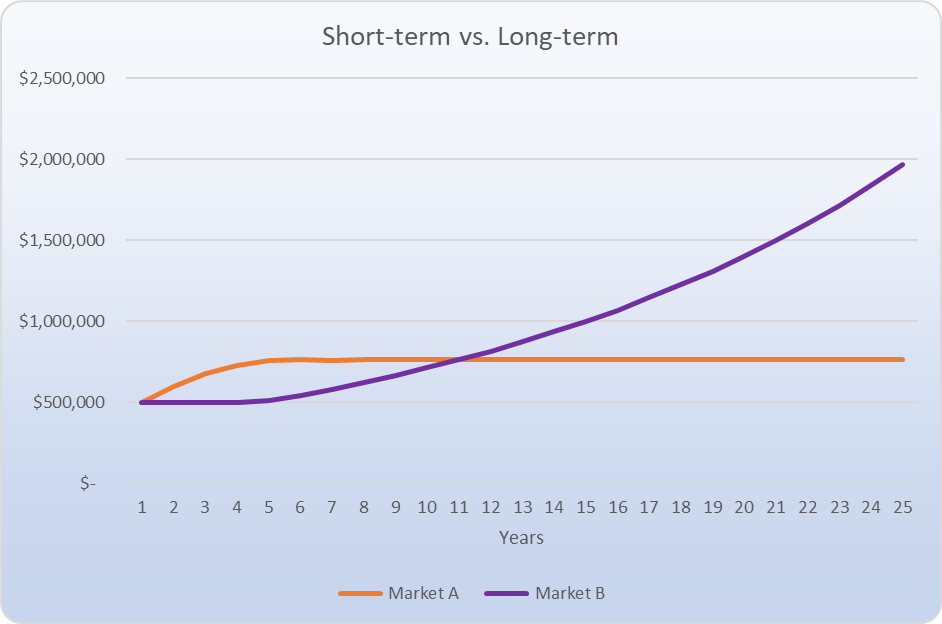
Where would you put your money if you knew the next 25 years of growth, market A or market B?
The best market would be A, the one that starts off fast and flattens out. This is the best option because after 5 years you’d sell out of market A and buy into market B with more funds than you’d have if you started off in market B at year zero.
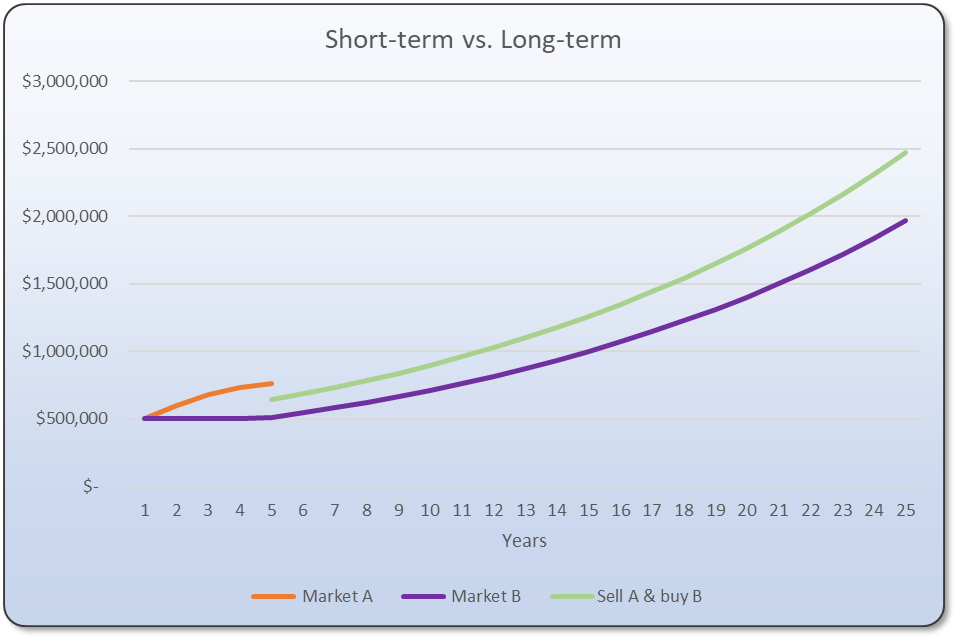
The chart shows the sale of the property in Market A at the end of the orange line and the start of the green line, which is at the 5-year point. The green line shows buying in Market B with more funds than you had at year zero.
Even after considering the costs of selling, like paying capital gains tax and the costs of buying again like stamp duty, you’d still be better off following this strategy than if you had bought into market B at year zero.
Can we know the growth profiles?
We can never know with absolute assurance. Everything is a range of probability. And that’s another important point: the chances of market A (orange) outperforming market B (purple) by 50% over 5 years is far more likely than market B outperforming market A by 300% over the next 20 years.
“Long-term outperformance is highly unlikely. Short-term outperformance is far more likely.”
Long-term is a level playing field
One in 44 property markets have had double the growth of the national average over the last 15 years. But 1 in 9 property markets have had double the growth of the national average over the last 5 years.
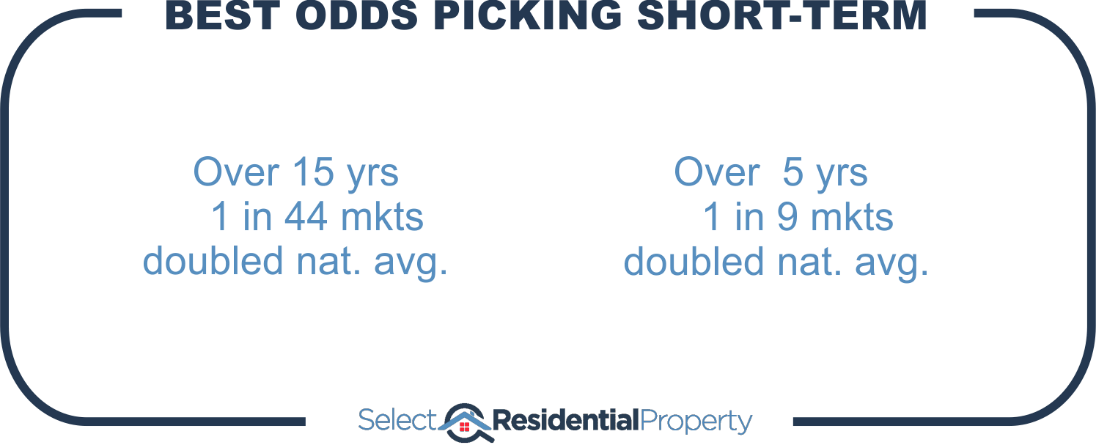
In other words, if your suburb selection method is purely random…
“You have nearly 5 times more chance of picking a short-term winner than a long-term winner”.
But that’s if you randomly select a suburb. If you don’t pick investment suburbs randomly, but apply some common sense, the odds stack up even more in favour of picking winners over the short-term. This is because there aren’t many indicators to pick long-term winners.
Time acts as a tremendous leveller of markets.
“As a general rule – most property markets will have similar growth long-term”
Probability says you’re barking up the wrong tree if you try to pick long-term winners. The longer your focus, the more likely you’ll have the same growth as most other markets.
I’m not saying you shouldn’t invest for the long-term. I’m simply saying that long-term outperformance is unlikely.
And it’s not just likelihood that improves when your focus is short-term. The difference in performance can be extreme.
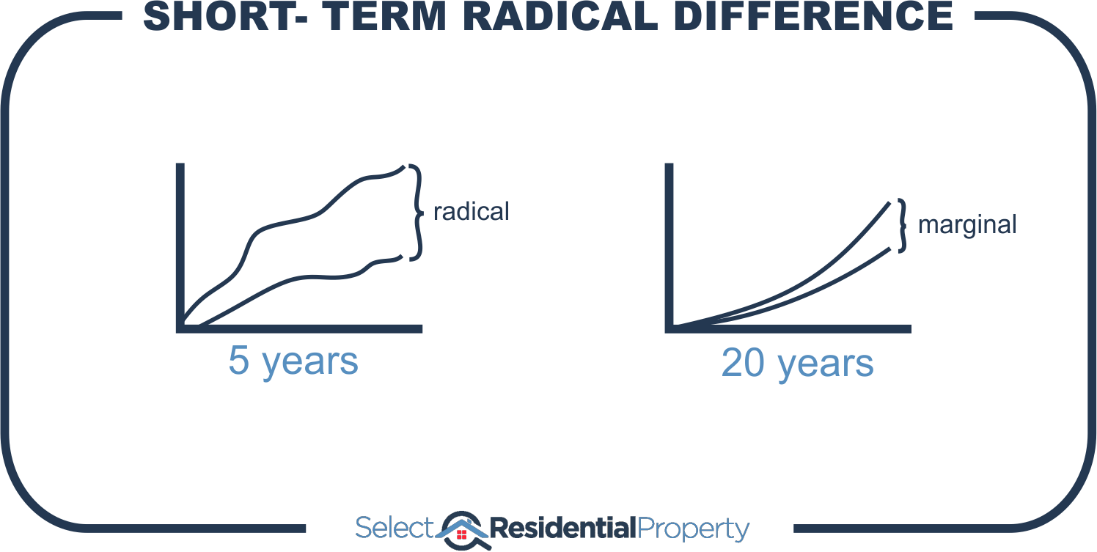
“If you want to outperform the averages, you need to have a short-term focus”
The odds are stacked against you from accomplishing that over the long-term.
Learn from mistakes
When you make a mistake at picking a short-term winner, you know you’ve made the mistake within about 18 months. Every few years you’re accumulating experience.
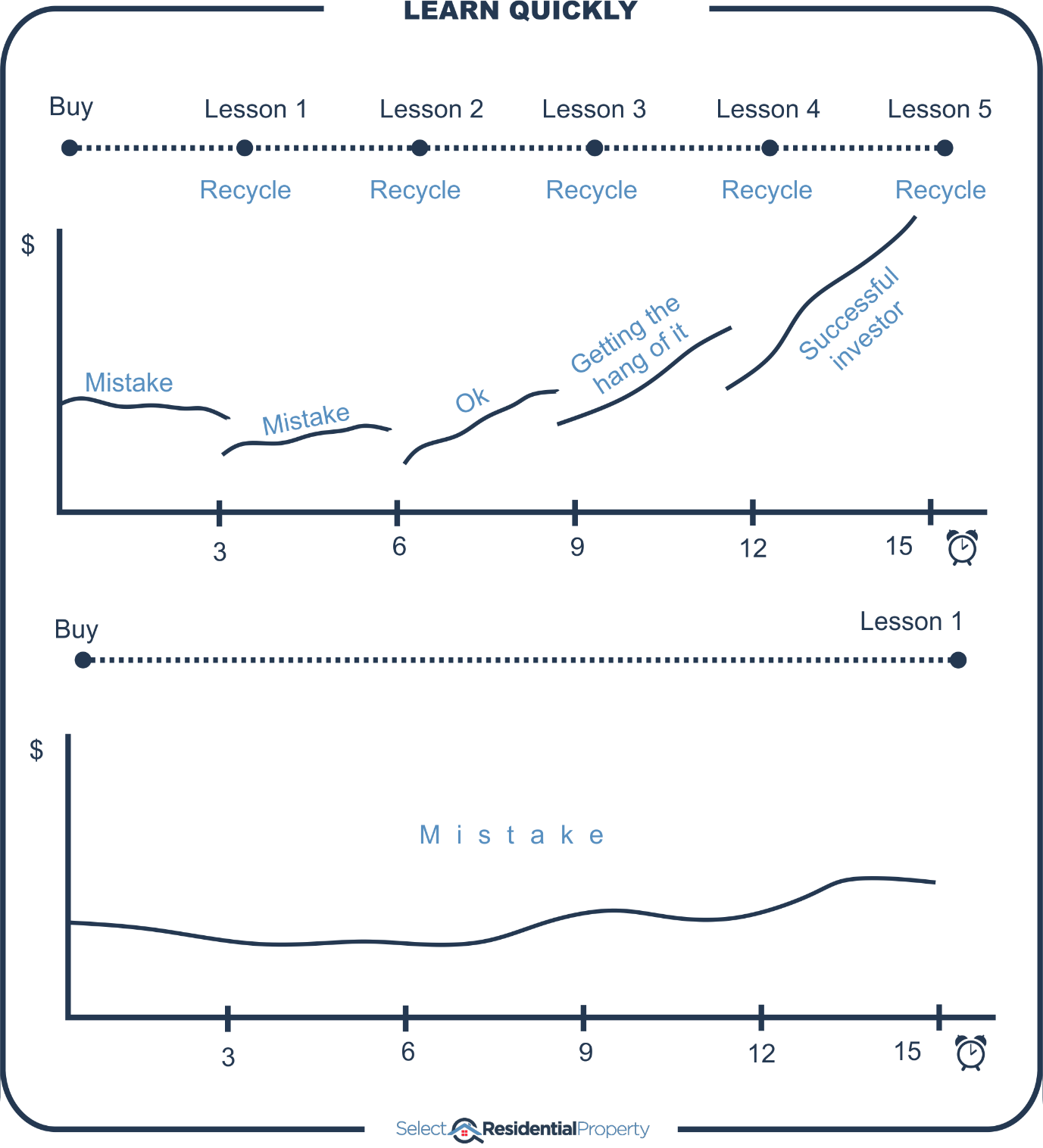
But how can you do that for a long-term growth strategy? If 15 years is enough to finally accept you made a mistake, it will take 30 years to get 2 slaps in the face to learn from.
Not much help for investors nearing retirement, is it? They’re not interested in a 25-year growth forecast anyway.
Last 100 years of growth
There are thousands of suburbs in Australia that have been piling on the capital growth for well over 100 years now. But in many of these locations about half of that 100 years of growth is about to be eclipsed in the next 10 years.
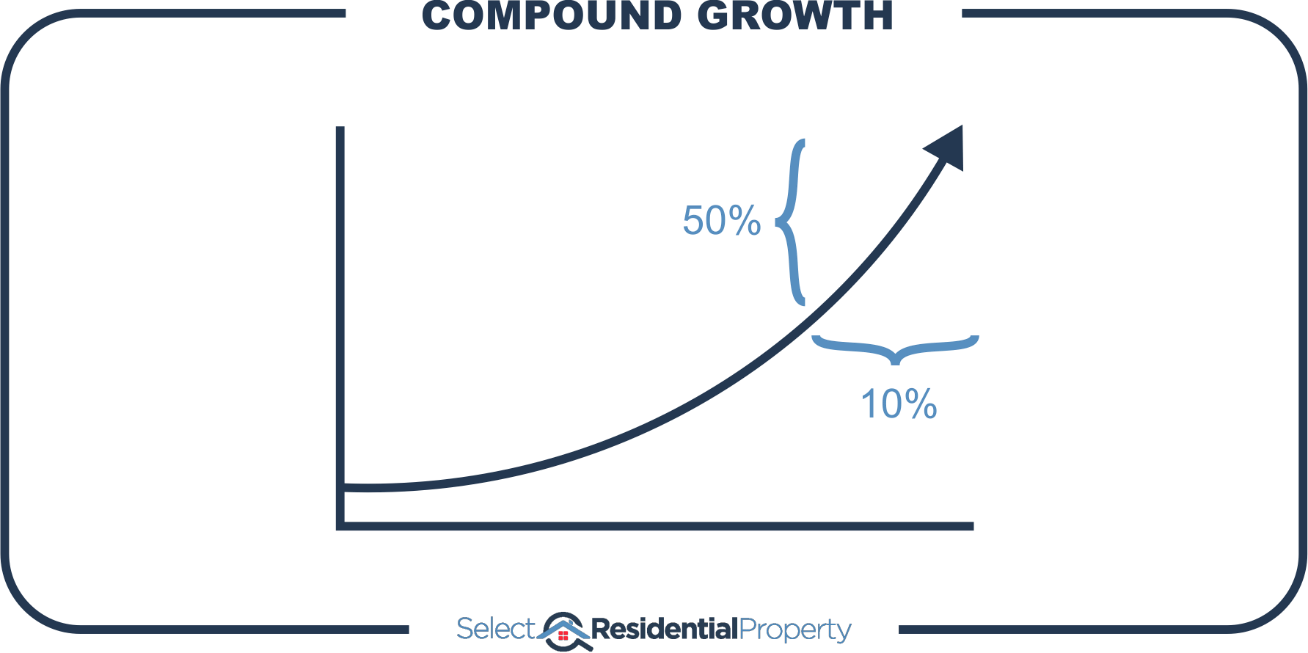
That’s 50% of the value being determined in just 10% of the history. The majority of the growth happens in the last boom. That’s where investors focus should be.
“Many of the outperformers of the last 30 years are simply the best performers of the last 5 years”
What the future holds
Here’s another reason why I believe a short-term focus is a good idea – we’ve got some idea of what the short-term future holds, but no idea of the long-term.
What impact will driver-less cars have on property markets? What impact will the next generation of remote access technology have? Will there be a big push to work from home 2 days a week? What impact will magnetic levitation vacuum tubes have?
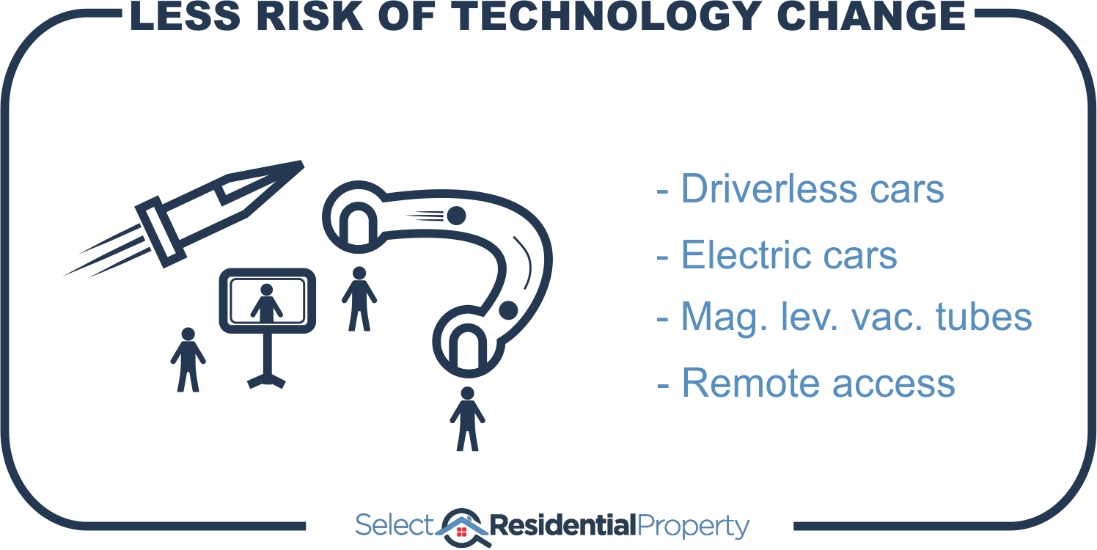
There could be technology of the future that radically alters the way we live within the next 20 years. Technology that nobody has even contemplated yet. How do we know the property markets we picked for long-term growth won’t be tragically affected?
A short-term focus makes an investor more agile to “new world” changes that might radically spoil long-term plans.
Use of technology to pick short-term winners
OK, my last point that supports a short-term focus. There’s been advances in data science that make picking short-term winners relatively easy.
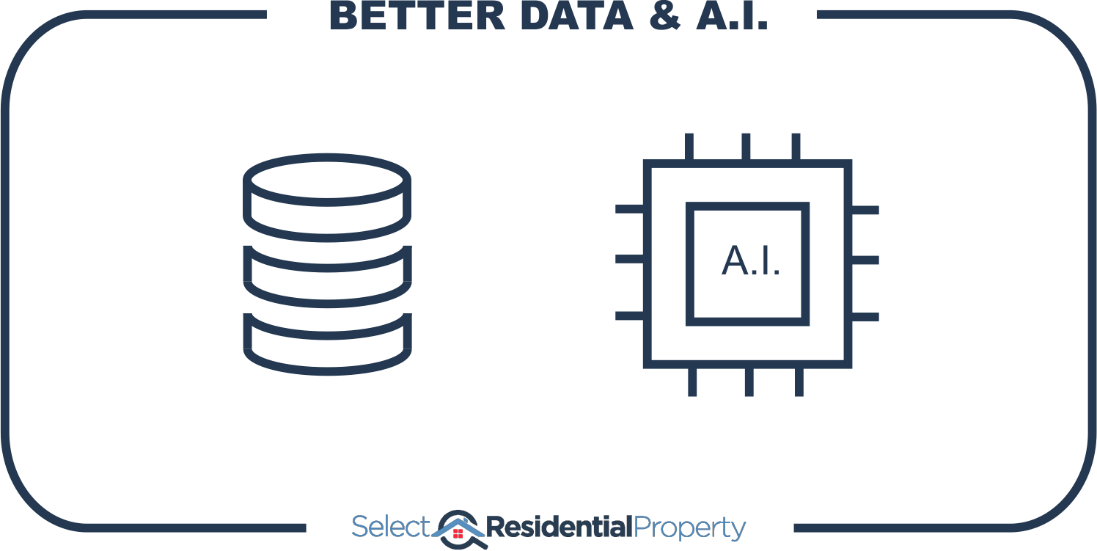
And a lot more data is becoming available every year. But none of it is data from 30 years ago. It’s therefore of no help to long-term investing. But it is of help to short-term investing.
Conclusion
I believe a short-term focus is superior to long-term because:
- You’ve got better odds of picking short-term winners
- Short-term winners radically outperform short-term losers
- Long-term winners don’t outperform long-term losers to the same degree
- You can learn from mistakes more quickly and recover
- You’re at less risk of technology change spoiling things
- Short-term prediction technology is a lot better now days & improving
- Long-term prediction technology is poor and unlikely to improve much
....................................................................................
 Jeremy Sheppard is head of research at DSRdata.com.au.
Jeremy Sheppard is head of research at DSRdata.com.au.
DSR data can be found on the YIP Top suburbs page.
Click Here to read more Expert Advice articles by Jeremy Sheppard
Disclaimer: while due care is taken, the viewpoints expressed by contributors do not necessarily reflect the opinions of Your Investment Property.